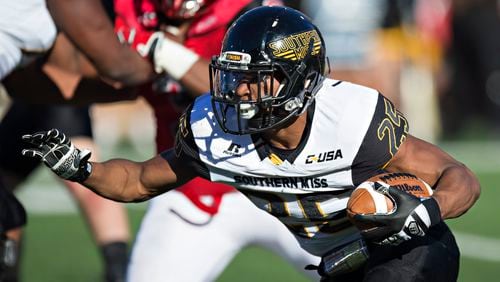The dust has settled from the 2018 NFL Draft and the Falcons’ operation could best be described as an utilitarian effort.
When a team is picking in the back of the draft it is not expected to always find pillars for the football team. The Falcons were clearly looking for players who could fit specific utility roles at the expense of their offensive line and the fullback position.
With a strong roster and quarterback Matt Ryan under contract for the foreseeable future after reaching a five-year $150 million contact extension, the Falcons added a potential offensive weapon, perhaps some secondary help and a defensive tackle. The remaining picks, which included two over-drafted players, were mostly for special teams purposes.
After the draft, the Falcons added 27 undrafted free agents, which included two fullbacks.
“We added athleticism and speed throughout this draft,” Falcons general manager Thomas Dimitroff said.
In the first round, the Falcons selected Alabama wide receiver Calvin Ridley, who will make $10.9 million over four years. He was the 26th pick overall and will be asked to replace wide receiver Taylor Gabriel.
With Ridley, there is no way to hide his 20 dropped passes over three seasons. He has to be a more consistent catcher and get off the line clean. Ridley dropped to 26 in the draft because of those issues. Wide receiver starved teams like Baltimore, Dallas and Carolina passed on him.
The Falcons were impressed with his route-running ability and seemingly ignored the dropped passes.
“In adding that explosiveness and the play-making ability along with what we already have in that group of receivers, obviously, is extremely encouraging for us,” Dimitroff said.
Cornerback Isaiah Oliver, who was selected in the second round, is a former decathlon competitor. But he only lifted 225 pounds, 12 times on the bench press in pre-draft workouts.
Is he going to be strong enough to re-route receivers at the line of scrimmage and dominate in the contact zone? Getting stronger in the Falcons weight training program shouldn’t be a problem over the long haul, but how much will he be ready to contribute in 2018?
Can he beat out Robert Alford and force an Alford, Brian Poole and Damontae Kazee competition at nickel back?
Deadrin Senat, the third-round pick, appears to be a two-down player. Unless defensive line coach Bryant Young works a football miracle, don’t expect to see him in the nickel or in pass-rush situations. The book on him is that he gets stuck on blocks from time to time. He is plenty strong enough to survive in the trenches. He bench pressed 225 pounds, 35 times.
The Falcons needed a tackle to help replace Dontari Poe, who left in free agency.
The Falcons selected Ridley over Florida defensive tackle Taven Bryan. Both were rated equally on their draft board, but there was a big dropoff at the wide receiver position while the pool at defensive tackle was much deeper.
On the last day of the draft, the Falcons made a couple of head-scratcher picks and made a shrewd trade up to land LSU special teams maven/wide receiver Russell Gage in the sixth round.
In the fourth round, the Falcons selected running back Ito Smith, who was a projected seventh-rounder.
“A stop-start running back,” Dimitroff said. “Really good run skills. Catches the ball well. Has (returned kickoffs) as well. He’s a versatile guy. Fits in very well with our offense.”
The Falcons hope that Smith replaces Terron Ward as the third-string back and plays on special teams. The Falcons don’t believe they over-drafted Smith.
“The fact that he didn’t go to the combine is a moot point for us,” Dimitroff said, defending the pick. “He is a good athlete with versatility.”
The Falcons clearly had Smith rated higher than his draft projection.
“We look at the player for us (and how he) fits in this system,” coach Dan Quinn said. “(He is) a very good fit for us.”
The Falcons are hoping that Smith does better than Brian Hill, who was drafted in the fifth round last season and couldn’t beat out Ward. He was released during the season and signed by Cincinnati.
Smith is short at 5-foot-8½ inches tall and light at 195 pounds. He was a productive runner who caught the ball well at Southern Mississippi.
He appears to be a slightly faster clone of former Falcons and Tampa Bay running back Jacquizz Rodgers. Smith ran the 40-yard dash in 4.49 seconds, while Rodgers ran a 5.64 and was taken in the fifth round in 2011.
“Not only is he a fantastic running back, he has the speed and toughness to play on special teams as well,” Quinn said.
The Falcons’ second sixth-round pick Foyesade Oluokun was the 44th-rated linebacker in this draft class and was projected to be a undrafted free agent. He runs the 40-yard dash in 4.48 seconds and has a role as a special teams gunner waiting for him as the Falcons must upgrade their coverage units.
“He has the potential to play other positions than inside linebacker,” Quinn said.
The Gage pick in the sixth round was strong. He was the star of the LSU Pro Day and several NFL special teams coordinators wanted him. He also has a role waiting for him on the coverage units.
“He is a real competitor,” Quinn said. “That was an important pick for us.”
The Falcons plan to pair Gage with Justin Bethel, a former Pro Bowl specials player with the Cardinals, and form a dynamic coverage tandem.
Gage, who started his career as a defensive back, had more than 500 yards from scrimmage and caught 28 passes last season. Assistant head coach/wide receivers Raheem Morris has a project to develop him as a wide receiver.
“All of these guys should have a significant role ... in some capacity (on special teams),” Quinn said. “Return game, cover teams. We made a real intentional effort to address some of that.”
The plan to use the draft to bolster the special teams makes some sense if you believe the offensive line set and one of the undrafted fullbacks can play.
Quinn noted that 20 percent of the plays in a game are special teams plays and last season, the Falcons were in the bottom on the league with a 22 of 32 rating on special teams in Rick Gosselin's industry leading rankings.
The coverage units ranked 32nd (last) in kickoff coverage at 26.2 yards per return.
Long-time special teams assistant coach Eric Sutulovich was fired and Mayur Chaudhari was added to assist special teams coordinator Keith Armstrong.
The Falcons consider Justin Hardy and Marvin Hall as the top candidates to replace returner Andre Roberts. Reggie Davis will also get a look.
Quinn also likes to consider the undrafted rookies free agents as part of the draft class.
Stanford fullback Daniel Marx, who’s 6-foot-1 and 253 pounds, and Nebraska fullback Luke McNitt, who’s 6-2, 256, signal a change at the position to more of the traditional battering-ram fullback.
The Falcons have struggled in short-yardage situations and want to add more power to the offense.
“Because we believe in competition so much, because we believe in developing the players, people know that coming here as a (undrafted) college free agent is an excellent way to go,” Quinn said. “We are going to make sure that they can battle against anybody. The best man is going to play.”
Here’s a look at the Falcons’ post-draft depth chart:
OFFENSE
WR 11 Julio Jones, 18, Calvin Ridley, 14 Justin Hardy, 16 Reggie Davis, Detrich Clark, Lamar Jordan
LT 70 Jake Matthews, 74 Ty Sambrailo
LG 67 Andy Levitre, 63 Ben Garland, 64 Sean Harlow, 75 Jamil Douglas
C 51 Alex Mack, 63 Ben Garland, J.C. Hassenauer
RG 65 Brandon Fusco, 71 Wes Schweitzer, Matt Gono, Salesi Uhatafe
RT 73 Ryan Schraeder, 68 Austin Pasztor, 76 Daniel Brunskill,
TE 81 Austin Hooper, 82 Logan Paulsen, 85 Eric Saubert, 89 Alex Gray, Troy Mangen, Jack Roh
WR 12 Mohamed Sanu, 17 Marvin Hall, Russell Gage, Christian Burke, Dontez Byrd, Devin Gray
QB 2 Matt Ryan, 8 Matt Schaub, 9 Grayson Garrett, Kurt Benkert
RB 24 Devonta Freeman, 26 Tevin Coleman, 25 Terrence Magee, Ito Smith, Justin Crawford, Demario Richard, Malik Williams
FB Daniel Marx, Luke McNitt
DEFENSE
DE 98 Takk McKinley, 50 Brooks Reed, Jacob Tuioti-Mariner, Anthony Winbush
DT Deadrin Senat, 95 Jack Crawford, 98 Garrison Smith, Jon Cunningham
DT 97 Grady Jarrett, 92 Justin Zimmer, Mackendy Chaeridan
DE 44 Vic Beasley, 90 Derrick Shelby, 55 J’Terius Jones
WLB 42 Duke Riley, Foyesade Oluokun
MLB 45 Deion Jones, Emmanuel Ellerbe, Emmanuel Smith
SLB 59 De’Vondre Campbell, Richard Lewis
CB 23 Robert Alford, Isaiah Oliver, 28 Justin Bethel, 33 Blidi Wreh-Wilson, 39 Deante Burton
CB 21 Desmond Trufant, 34 Brian Poole, 35 Leon McFadden, Secdrick Cooper, Chris Lammons
NB 34 Brian Poole, 27 Damontae Kazee, 42 Tyson Graham, Joseph Putu
FS 37 Ricardo Allen, 27 Damontae Kazee, 38 Marcelis Branch
SS 22 Keanu Neal, 36 Kemal Ishmael, 41 Quincy Mauger
SPECIALISTS
K 3 Matt Bryant, David Marvin
KO 5 Matt Bosher
P 5 Matt Bosher
KR 14 Justin Hardy, 17 Marvin Hall, Ito Smith
PR 14 Justin Hardy, 16 Reggie Davis
LS 47 Josh Harris
H 5 Matt Bosher



/cloudfront-us-east-1.images.arcpublishing.com/ajc/P7DYBH6TO7FEKG4SUXQQKADRXE.jpg)



